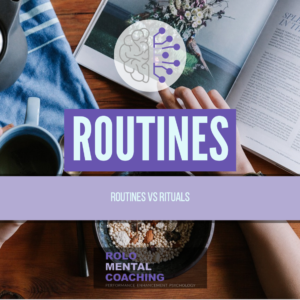RMC Weekly Blog: Routines VS Rituals

The definition that Rolo Mental Coaching adopts about routines is a systematic sequence of physical (motor) and psychological behaviors that influence performance functionally, leading to increased performance and stability of the performance.
We make a clear difference between rituals and routines at Rolo Mental Coaching. The separation and the defining difference here are in the word “functionally”.
Rituals are certain behaviors or actions that an athlete performs with the belief that these behaviors have a specific purpose, or power, to influence their performance. Many athletes believe that performing a specific ritual before competition improves their performance.
To give a clear example of the difference between rituals and routines we draw attention to the performed behavior. For example when a tennis player is about to serve there is a set sequence of techniques that contribute to performing a masterful execution of a serve. Most players have a strong stance, breath, bounce the ball a set amount of times, and bring their hands together to prepare for one arm to toss the ball and the other to move in position to swing and hit the ball towards the opponent’s side of the court. This sequence is what we would consider a routine. Some details that are more personalized we left out because this leads us into the part that is ritual-based. A ritual in our opinion does not have an immediate technical contribution to the performed motion but contributes to the state of mind the player is in. Some players like to bounce the ball through their legs before starting their main routine, some adjust their hair the same way every time. Some players believe that touching the lines when walking back to their seats will bring bad luck. These are ritualistic behaviors and thoughts. They may contribute but are not essential for the routine to be executed successfully. We at Rolo mental coaching don’t usually teach rituals. But they do occur due to the natural preference and uniqueness of the individual. We have come to describe them as undefined aspects that may be beneficial to support the routine effective outcome and assist with the stability of the routine over a set period of time. In other words, players find them comforting and help them gain confidence.
This example explains a short routine that assists to perform a specific task at a certain moment. However, there are daily routines and other routines that affect performance in the long run that produce overall stability in a person’s life
Your daily routines influence your quality of rest and performance. Your biorhythm and sleep schedule/habits affect your mental sharpness, performance, emotional well-being, and energy levels. It is useful when you maintain a consistent time for waking and going to bed. Better health is a likely result of just a little extra planning and consistent behavior.
Routines help a person feel more in control of their lives and skillset, even though success is not always imminent. We believe that the majority of our behaviors are automatic habits or unconscious learned behavior patterns. This is why parents and coaches play such a critical role in introducing positive and effective behaviors.

How does one develop routines?
- You can start by identifying your current occupation or goals to begin giving meaning and focus to your actions and thoughts.
- Identify what you want to gain from your routines.
- Understand that routines are unique to each individual, so make them specific to you.
What are some benefits of routines?
- more efficient in setting & achieving goals.
- less stressed, happier & healthier.
- no more procrastination.
- more dependable.
- increased resilience.
- learn more & become better at what you’re doing
- have more structure
- higher sense and consciousness
Some things to consider though is that routines are intense to learn and it takes strength to develop them. And they won’t give results immediately.
Life’s events often disrupt the continuity of routine building.
An unprepared or untrained mind will likely see routines as boring and monotone.
Without healthy goals setting skills you will stagnate and grow at a much slower pace.
Make sure that you see that the routine benefits you and is healthy in the short- and long run, for not all routines are productive or healthy.
Having daily positive routines is productive in life and beneficial — to a certain extent. Routines can help you focus better, work more efficiently, and have more control over your life. However, planning out every moment of every day is not the point here. Build a daily routine for specific goals or techniques. Set a schedule and reserve time during the day to work on your personal goals. We also advise leaving ample time for non-specific tasks, like leisure and hobbies that allow free-floating creativity. We often set these private tasks as rewards for achieved goals, although they are not obligatory in this order.
What have you done today that earns you some time off? 🙂
Rolo Mental Coaches are specialists in high-performance coaching.
Follow us on Instagram and FaceBook.
If you are interested in working with RMC, feel free to reach out to us via our contact page by clicking here.

